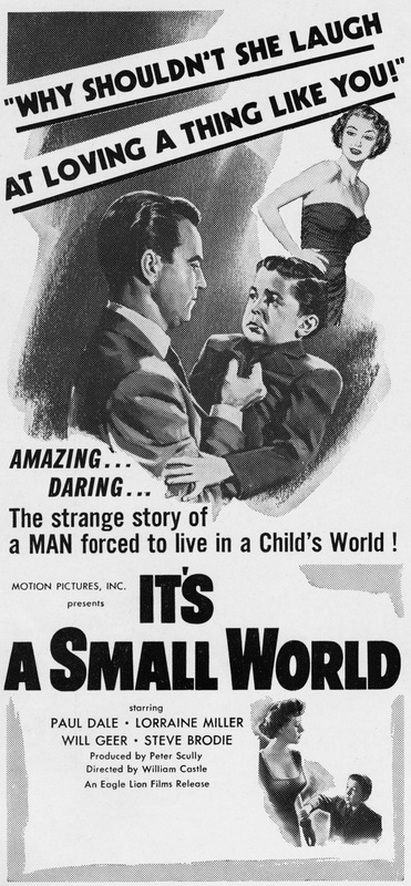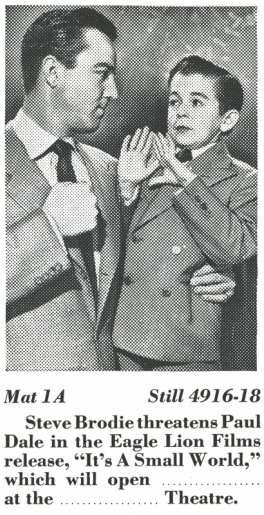It's A Small World (1950)
"This is the story of a special group of people. It concerns the great difficulty they have in adjusting themselves to a normal world. It is hoped that by better understanding the lives of these people a greater and deeper knowledge of all humanity will come to us." So begins It's A Small World, a melodrama with film noir overtones co-written and directed by a filmmaker more commonly known for his outlandish theatrical gimmickry and ballyhoo, the one and only William Castle.

The noir aspects likely stem from Castle's prior projects, the films Undertow and Johnny Stool Pigeon (both 1949), and his successful Whistler and Crime Doctor series from previous years. For It's A Small World, Castle switched gears to profile a minority that often faces ridicule and prejudice: dwarves. Though one might expect something akin to The Terror of Tiny Town (1938) from a showman known for his crass promotional stunts, Castle's film is a straightforward drama with only faint traces of the filmmaker's fondness for freakish imagery.
It's A Small World opens with twelve-year-old dwarf Harry Musk ("Paul Dale," aka Dale Paullin) getting his ass kicked by schoolyard bullies. William, his loving but clueless farmer father (Will Geer, Grandpa Walton himself), decides to homeschool Harry to shield him from further childhood cruelty. Harry's only friend is his neighbor Janie, who he watches develop into an attractive young woman. To Harry's dismay, Janie reads to him from Part I of Gulliver's Travels, "A Voyage to Lilliput." But the diminutive young man is heartbroken when Janie leaves town to be married.
After overhearing his sister Susan (Shirley O. Mills) complaining about her reluctance to invite her friends inside for fear of their reaction to her pint-sized brother, Harry decides to leave home in the company of Jackson (Thomas Browne Henry), a sleazy carnival owner. During a diner stop, Jackson so humiliates Harry that he flees through a bathroom window. Upon arriving in in the big city, Harry befriends Sam (Todd Karns), a kindly shoeshiner who puts him to work. The customers soon prefer Harry, to his mentor's delight.
Harry's stint as a shoeshine ace collapses after meeting his sexy neighbor Buttons (Lorraine Miller), a blonde floozy involved with small-time crooks. Smitten with the shapely skank, Harry is talked into joining Buttons' abusive boyfriend Charlie (Steve Brodie) and obese criminal mastermind Rose (Nina Koshetz) in their plan to send him, disguised as a child, to pick pockets on the city streets. Harry rakes in the ill-gotten dough, but calls the cops in retaliation when Buttons ridicules his heartfelt marriage proposal.
It's A Small World opens with twelve-year-old dwarf Harry Musk ("Paul Dale," aka Dale Paullin) getting his ass kicked by schoolyard bullies. William, his loving but clueless farmer father (Will Geer, Grandpa Walton himself), decides to homeschool Harry to shield him from further childhood cruelty. Harry's only friend is his neighbor Janie, who he watches develop into an attractive young woman. To Harry's dismay, Janie reads to him from Part I of Gulliver's Travels, "A Voyage to Lilliput." But the diminutive young man is heartbroken when Janie leaves town to be married.
After overhearing his sister Susan (Shirley O. Mills) complaining about her reluctance to invite her friends inside for fear of their reaction to her pint-sized brother, Harry decides to leave home in the company of Jackson (Thomas Browne Henry), a sleazy carnival owner. During a diner stop, Jackson so humiliates Harry that he flees through a bathroom window. Upon arriving in in the big city, Harry befriends Sam (Todd Karns), a kindly shoeshiner who puts him to work. The customers soon prefer Harry, to his mentor's delight.
Harry's stint as a shoeshine ace collapses after meeting his sexy neighbor Buttons (Lorraine Miller), a blonde floozy involved with small-time crooks. Smitten with the shapely skank, Harry is talked into joining Buttons' abusive boyfriend Charlie (Steve Brodie) and obese criminal mastermind Rose (Nina Koshetz) in their plan to send him, disguised as a child, to pick pockets on the city streets. Harry rakes in the ill-gotten dough, but calls the cops in retaliation when Buttons ridicules his heartfelt marriage proposal.

For It's A Small World, Castle was fortunate to secure a veteran cast of character actors to lend gravity to what could have been a Grade Z embarrassment. Chief among them was Geer, whose resumé lists over one hundred films and television programs. Shirley Mills' screen debut was as the title character in the creepy exploitation film Child Bride (1938), but she moved up to John Ford's The Grapes of Wrath (1940) before bottoming out in uncredited roles. Film noir stalwart Brodie (1947's Out of the Past), who appeared in features by Anthony Mann, Sam Fuller, and many others, was known to relish playing villains, as he does here. Todd Karns, the cheerful shoeshiner, is most recognizable as Jimmy Stewart's brother in the Christmas perennial It's A Wonderful Life (1946). But the longest acting filmography belongs to Thomas Browne Henry, who was frequently cast as military brass and will be instantly familiar from his many roles in westerns, sci-fi films, and television series of the fifties and sixties. Comely Lorraine Miller appeared in numerous films, often uncredited, before bowing out with minor appearances in television series such as The Donna Reed Show.
Sadly, the weakest link in the cast is Paullin, whose acting range, to quote Dorothy Parker on Katherine Hepburn, "runs the gamut of emotions from A to B." His performance suffers particularly when compared to the lively delivery of vivacious little Anne Sholter as his eventual love interest, Dolly. Now 90 years old, Marshalltown, Iowa resident Paullin, a former radio disc jockey and country and western band member, created a furor for fans of The Wizard Of Oz by claiming to have been a member of The Lollipop Guild. Though he claims that his scenes were eventually discarded, the evidence seems to suggest otherwise.
The crisp black and white cinematography by Oscar-winner Karl Struss, whose work stretches from the silent era to 1959's The Alligator People, is characteristically polished. Especially memorable is a scene of a drunken Harry perched atop a piano in a nightclub as snickering patrons gather around him. In a portent of his subsequent shenanigans, Castle indulges his inner surrealist with segments in which Harry is bullied in his nightmares by his own shadow, and in an "escape" sequence as Harry envisions the leering, laughing face of the carny Jackson superimposed against a cornfield.
Divided into three chapters representing stages of Harry's life ("The Boy," "The Woman," and "The Circus"), It's A Small World is never less than compelling, though it suffers not only from Paullin's limited range but from composer Karl Hajos' syrupy, bathetic score. The most damage is incurred near the film's conclusion, as Paullin sings "It's A Small World" (thankfully, not the satanic Disney number) to his intended bride Dolly. It's a cutesy, campy interlude that defies the film's purported serious intent.
Unfortunately, home viewers will see the film without the benefit of its unique ballyhoo. Showman extraordinaire Castle ingeniously promoted It's A Small World by hiring half a dozen pituitary giants, each over seven feet tall, to serve as ushers during the film's roadshow engagement. The oversized "ushers" were instructed to smirk and glare menacingly at theater patrons to provide perspective on the reality of living as a small person in a big world. The illusion was heightened through instructions to the concession stand to serve popcorn and soft drinks only in specially constructed oversized containers. These containers became the prototype of the sizes in use today.
Ironically, for a film that supposedly illustrates how a member of this "one in a million" minority shares the same desires as the rest of humanity, the final moments of It's A Small World seems to suggest that Harry's only chance at happiness is to be with his own kind in the confines of the Cole Brothers Circus. The late Hervé Villechaise, dwarf, actor, painter, and noted pussy hound, would have called bullshit on this pandering conclusion. Speaking of bullshit: I invented the paragraph about the film's promotion by Castle, who didn't dream up his famed gimmicks until he made Macabre eight years later.
It's A Small World is available on DVD, though with no supplements, from Warner Archive.
Sadly, the weakest link in the cast is Paullin, whose acting range, to quote Dorothy Parker on Katherine Hepburn, "runs the gamut of emotions from A to B." His performance suffers particularly when compared to the lively delivery of vivacious little Anne Sholter as his eventual love interest, Dolly. Now 90 years old, Marshalltown, Iowa resident Paullin, a former radio disc jockey and country and western band member, created a furor for fans of The Wizard Of Oz by claiming to have been a member of The Lollipop Guild. Though he claims that his scenes were eventually discarded, the evidence seems to suggest otherwise.
The crisp black and white cinematography by Oscar-winner Karl Struss, whose work stretches from the silent era to 1959's The Alligator People, is characteristically polished. Especially memorable is a scene of a drunken Harry perched atop a piano in a nightclub as snickering patrons gather around him. In a portent of his subsequent shenanigans, Castle indulges his inner surrealist with segments in which Harry is bullied in his nightmares by his own shadow, and in an "escape" sequence as Harry envisions the leering, laughing face of the carny Jackson superimposed against a cornfield.
Divided into three chapters representing stages of Harry's life ("The Boy," "The Woman," and "The Circus"), It's A Small World is never less than compelling, though it suffers not only from Paullin's limited range but from composer Karl Hajos' syrupy, bathetic score. The most damage is incurred near the film's conclusion, as Paullin sings "It's A Small World" (thankfully, not the satanic Disney number) to his intended bride Dolly. It's a cutesy, campy interlude that defies the film's purported serious intent.
Unfortunately, home viewers will see the film without the benefit of its unique ballyhoo. Showman extraordinaire Castle ingeniously promoted It's A Small World by hiring half a dozen pituitary giants, each over seven feet tall, to serve as ushers during the film's roadshow engagement. The oversized "ushers" were instructed to smirk and glare menacingly at theater patrons to provide perspective on the reality of living as a small person in a big world. The illusion was heightened through instructions to the concession stand to serve popcorn and soft drinks only in specially constructed oversized containers. These containers became the prototype of the sizes in use today.
Ironically, for a film that supposedly illustrates how a member of this "one in a million" minority shares the same desires as the rest of humanity, the final moments of It's A Small World seems to suggest that Harry's only chance at happiness is to be with his own kind in the confines of the Cole Brothers Circus. The late Hervé Villechaise, dwarf, actor, painter, and noted pussy hound, would have called bullshit on this pandering conclusion. Speaking of bullshit: I invented the paragraph about the film's promotion by Castle, who didn't dream up his famed gimmicks until he made Macabre eight years later.
It's A Small World is available on DVD, though with no supplements, from Warner Archive.